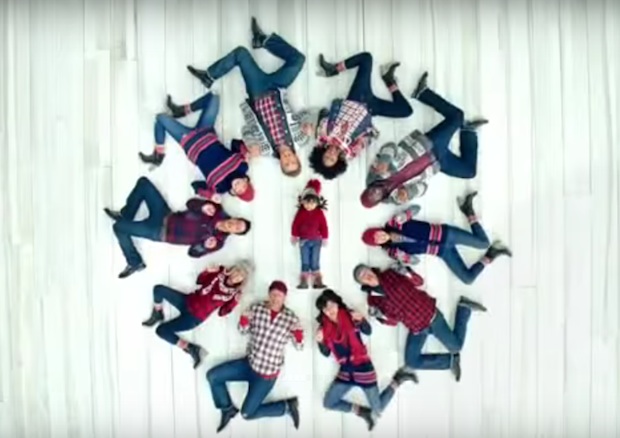Back in 2009, Gap released one of my favorite holiday commercials. It featured a group of happy, sweater-wearing, scarf-clad people dancing while chanting the following:
Two, four, six, eight, ’tis the time to liberate! Go Christmas! Go Chanukah! Go Kwanza! Go Solstice! Go classic tree! Go plastic tree! Go plant a tree! Go without a tree! You 86 the rules. You do what just feels right. Happy do whatever you wannukah and to all, a cheery night!
My then-eight-year-old daughter loved the commercial as well and quickly memorized the lyrics. She wanted to know if it was appropriate to wish people a “happy do whatever you wannukah” instead of the more traditional “Merry Christmas” or “Happy Chanukah.” I explained to her that it was probably best to stick with the more traditional wishes, but it was important for her to remember that the holiday season is filled with many different religious celebrations, each with its own rituals and customs.
Soon after this discussion, my daughter and I had lunch at a local restaurant. A nice waitress who was wearing a Christmas sweater and reindeer antlers was taking good care of us. As we finished our meal, she brought a cookie decorated as a Christmas wreath to the table and asked my daughter what she wanted Santa Claus to leave for her under the tree. I froze, not knowing how my kid, who has always been very outspoken, was going to respond to this. Was our recent discussion about the many different religious celebrations at this time of year going to be reflected in her answer?
“Thank you,” my daughter said as she bit into the cookie, “but Santa doesn’t come to my house.”
“Not bad,” I thought, curious as to where this conversation was heading.
“No way,” said the waitress, smiling ear to ear, “Santa comes to every kid’s house – unless they’re naughty! Did you get in trouble this year?” Deeply offended by this question and feeling extremely protective of my daughter, I began to respond to the waitress, but before the words left my mouth, my daughter was already talking.
“No, silly, I didn’t get in trouble,” she said. “We’re Jewish. We celebrate Chanukah!” She lowered her voice and looked around to ensure that no one else could hear her, “I don’t even believe in Santa Claus. But it’s okay if you do.”
The next thing I knew, the waitress sat down on one of the empty chairs at our table. She tried to apologize to my daughter, who told her that it wasn’t necessary.
“There’s lots of different religious celebrations this time of year. It gets kind of confusing,” explained my daughter, making me proud! At the waitress’ request, my daughter began to teach her about Chanukah. After a few minutes, the waitress excused herself and disappeared into the kitchen. When she returned, she was carrying our check and a small plate.
“Here you go,” the waitress said, handing the plate to my daughter. “I decorated this one myself. Happy Chanukah!” Sitting on the plate was another cookie. Instead of a Christmas wreath, this one was decorated with a simple Chanukah menorah. “Thanks for teaching me so much,” the waitress said as she winked at my daughter.
We are living in a time when wishing someone a “Merry Christmas” or “Happy Chanukah” can get you in trouble. Some say it’s better to stick with the more politically correct “Happy Holidays.” On the other hand, just last month, we watched Starbucks get into trouble because they removed holiday designs from their winter coffee cup. Some assert that Starbucks’ new winter cup, a simple red cup that includes the company’s green logo, is part of a “war against Christmas.” While I did not realize it back in 2009, the Gap ad that I mentioned above was actually a sarcastic response to those who said the clothing company’s advertisements didn’t do enough to promote Christmas.
As we enter a time of year when many religions, not just Judaism and Christianity, celebrate holidays, it shouldn’t be so difficult to express our own joy and extend good wishes to our friends and neighbors as they celebrate their holidays.
My daughter’s interaction with the waitress six years ago taught me how important it is to stop assuming that people who extend holiday wishes to us have anything but good intentions. If you don’t celebrate Christmas, there’s absolutely nothing wrong with someone genuinely wishing you a “Merry Christmas”. At the same time, once you assume that people are coming from a good place, there’s nothing wrong with respectful, honest responses to holiday wishes when appropriate. If Santa doesn’t come to your home, it’s okay to share this information kindly without ruining someone else’s holiday experience. You never know; your kindness and your honesty might just earn you a cookie personally decorated to reflect the holiday of your choice.

Rabbi Andrew Jacobs has been the spiritual leader of Ramat Shalom Synagogue (www.ramatshalom.org) in Fort Lauderdale, Florida since 2002. He is the founder of ISH (www.findyourish.com), an innovative spiritual source and service that enables all spiritual seekers with opportunities to connect with Jewish wisdom. Ordained by the Reconstructionist Rabbinical College, Rabbi Jacobs is a graduate of Vassar College and holds a Masters of Arts in Jewish Art and Material Culture from the Jewish Theological Seminary in consortium with Columbia University and the Jewish Museum of New York. He posts regularly on his blog (rabbiandrewjacobs.org).

